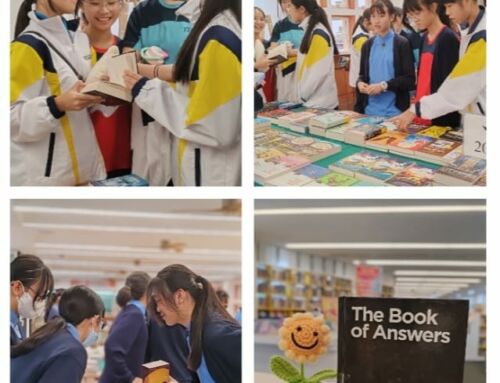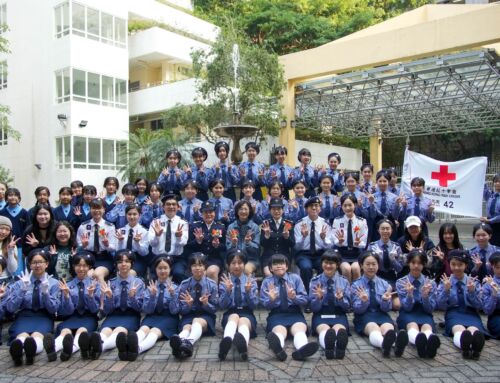In order to broaden the horizons of our students, our school held an excursion to Shimabara Peninsula in Japan from 16th to 21st April, 2025. The co-organizer of this excursion was the Hong Kong UNESCO Global Geopark, and the reception of the tour was provided by the Unzen Volcanic Area UNESCO Global Geopark in Japan.
We began with a visit to the Mt. Unzen Volcano Museum in Shimabara City, where students gained insights into the region’s volcanic history, particularly the eruptions from 1990 to 1995. Nearby, we visited the Buried Houses and the remains of the Onokoba Elementary School, which serve as powerful reminders of the disaster’s impact.
Engaging in exchange activities with local high school students at Koka High School offered a unique opportunity for cultural exchange. Students experienced wearing kimonos, drew Japanese fans, and played traditional games. These hands-on activities fostered friendships and teamwork while enhancing their understanding of Japanese culture.
The Minpaku Homestay Program allowed students to immerse themselves in local culture by staying with farmers or fishermen in Minami-Shimabara City. This experience connected them with the community and illustrated the relationship between geography, economy, and culture.
We also visited important geo-sites, including Unzen Jigoku, the Nita Pass Observatory, and Obama Marine Park, where students observed the interrelationship between natural landscapes and human activity. Then, a tree-planting activity at Tashirohara Plateau emphasized environmental responsibility and sustainability.
In Nagasaki, we explored significant historical sites such as the Peace Park and Atomic Bomb Museum, which provided crucial context for understanding the effects of the atomic bombing and reflecting on the messages of peace. Visits to the Oura Cathedral, Glover Garden, and the Dejima Museum further enhanced our historical perspective on foreign influence and trade in Japan.
Sharing from Students:
5D Poon Tsz Kwan Kaitlyn:
At the Mt. Unzen volcano museum and memorial park, I learned about the devastating eruptions and how communities responded to the disaster. I was amazed by the resilience of Japanese houses—some roofs remained intact despite the destruction. This experience deepened my understanding of natural disasters and reinforced the importance of disaster prevention and mitigation.
In the afternoon, we visited Koka High School. We got a glimpse into the students’ daily lives and their school environment. They welcomed us very warmly and prepared different mini-games for us. We also had the chance to wear kimonos, which are traditional Japanese clothing. They wrapped a belt (obi) around our waists very tightly and gave us a pair of zori, which are surprisingly difficult to walk in. They also taught me a new Japanese phrase, きれい (ki rei), which means beautiful. Even though there was a language barrier, I was able to make wonderful friends. The warm welcome we received was truly touching. The cultural exchange, from drawing on paper fans to taking Polaroids together, was incredibly fun. I loved experiencing their school life and would love to show them my school and city someday. I truly hope we stay in touch! Today was unforgettable, filled with learning, laughter, and new friendships.
After seeing the museum and learning about the destruction caused by Mt. Unzen’s eruptions, I feel deeply grateful that Hong Kong doesn’t face such devastating natural disasters. Witnessing the aftermath made me realize how fragile life can be, and I admire the strength of the people here who rebuilt their homes and lives. I’ll remember their resilience and not take safety for granted.
5C Wan Choi Ting Emily:
The places we visited in these two days made me realize the power and influence of both Mother Nature and us humans.
At the Chijiwa Observatory, we saw the large normal fault that sank the mountain. In geography lessons, we also learned about the fault, but I never thought it could be this big or that it could sink so much of a mountain. This made me realize that the power of Mother Nature has always been massive and influential, but we humans tend to forget this fact.
On the other hand, the Atomic Bomb Museum, Dejima Museum, and Glover Garden made me realize the strong power we hold within our hands. During our visit to the Atomic Bomb Museum, I saw many heartbreaking pictures of people enduring severe injuries from the bomb. The bomb was never a natural disaster but a human wrongdoing. In other words, it could have been prevented. Undoubtedly, the invention of the atomic bomb is significant and a great step toward modern science, bringing new insights and facilitating better inventions, but we should always think about how to use our resources.
The Museum of the 26 Martyrs of Japan made me realize that we should always be inclusive and embrace diversity. In the past, Japanese people hated Christianity and killed those who believed in it. However, in the modern world, many Christians exist, and Christianity has even become a signature faith, with the Bible being the most famous book in the world. The deaths of many Christians, especially the 26, could have been prevented. We should always embrace diversity and new ideas, and not stop them, because who knows where they can take us?
Lastly, the Dejima Museum made me realize that although we humans face many hardships, we still have more power than we imagine. At the Dejima Museum, we learned about how the Portuguese were confined to stop the spread of new Western ideas and Christianity. While the Japanese made great efforts to stop the spread of Western ideas, even confining them, the Portuguese still managed to spread these ideas, leading to the growth of Christianity and many Christians in Japan today. This made me realize that we actually have much more power than we imagined.
The power of nature is undoubtedly great, yet the power within us is also massive. We can prevent certain disasters. We have the power to cause great damage and destruction, and we also have the power to cause massive suffering. Yet, we also have the power to spread new ideas and influence others. It is important to know how to utilize the great power we have, whether toward destruction or creation.



















